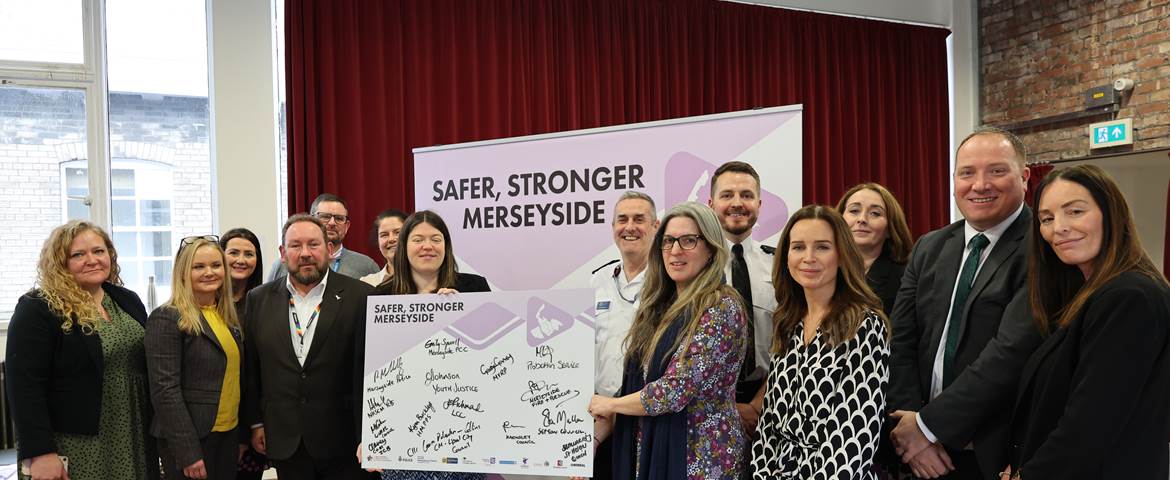
Organisations across Merseyside will unite today (Friday 9th February) to launch a new plan to drive forward the work to prevent and reduce serious violence across our region.
Statistics released last week show serious violence on Merseyside has decreased by 8% in the past year, knife crime is down by 18.6% and gun crime is at the lowest level since records began 22 years ago.
The new Merseyside Serious Violence Duty Strategy focuses on how agencies across Merseyside can work even closer together to continue to drive this downward trend, preventing more people being drawn into serious violence, creating a safer, stronger region.
Overseen by the region’s Police and Crime Commissioner (PCC), Emily Spurrell, the Strategy details how Merseyside Police, Merseyside Fire and Rescue Service, the region’s five local authorities, NHS Merseyside and Cheshire, and the prisons and probation service will take a public health approach to preventing serious violence.
This means understanding what leads to serious violence, the causes and the triggers and acting to prevent it occurring in the first place.
Today’s launch at the Cotton Exchange in Liverpool, will be opened by the PCC and Merseyside Police’s Deputy Chief Constable, before Liverpool spoken word artist and poet Joseph Roberts will help to bring the new strategy to life.
There will then be sessions focusing on best practice featuring Liverpool City Council’s Serious Violence Community Forum and Wirral Council on the work of EVOLVE in their areas, which sees the PCC and police working with partner and residents to disrupt and deter organised crime and protect communities, as well as a panel discussion, before representatives will pledge their commitment to delivering the new Strategy.
The Strategy set out how partners will work across three crucial pillars driven by clear short, medium and long-term objectives, all focused on making the biggest difference in our communities:
- People – building resilience and creating meaningful, valuable opportunities.
- Places – creating safer places and spaces.
- Partnerships – strengthening the bonds between organisations to continue to improve the combined response.
The 68-page strategy is the product of extensive consultation carried out in 2023 and demonstrates the commitment from organisations, known as ‘specified authorities’ to meet their requirements under the Serious Violence Duty which came into effect in January.
The Duty requires organisations to work together to share information, collaborate and plan to prevent and reduce serious violence within their local communities.
To achieve this, the Strategy sets out eight core principles which will be at the heart of this work, with a real focus on community cohesion – empowering communities to make sure they have a voice and are actively involved in addressing and solving the issues that matter to them. This includes equipping people to develop new skills and deliver interventions which are long-term sustainable; delivered by communities for communities.
Progress against the objectives will be overseen by the Merseyside Strategic Policing and Partnerships Board (MSPPB) chaired by the Police and Crime Commissioner and the plan will be refreshed annually to ensure it is responsive to local need.
Merseyside Police and Crime Commissioner Emily Spurrell said: “Our region has come a long way in reducing and preventing serious violence in recent years. Gun crime, knife crime and all serious violence offences have decreased significantly.
“This is hugely welcome, but there is still more we can all do.
“The launch of this Serious Violence Duty Strategy is important because it sets out our ongoing commitment to working together to prevent and tackle serious violence and the harm it causes, preventing families from suffering the devastation and harm it brings.
“Anyone can be affected by serious violence and sadly, our region is no stranger to the life-changing consequences – for victims, relatives, loved ones, friends and witnesses – when tragedies occur. That’s what drives us to work even harder and why prevention is essential.
“To deliver lasting change, we must get upstream, intervene early, and stop violence from happening in the first place. By working together, I firmly believe we can continue to build a safer, stronger Merseyside, free from violence and the fear of violence.”
Cllr Shelley Powell, Knowsley Cabinet Member for Communities and Neighbourhoods, said: “Knowsley fully supports the launch of the new Serious Violence Duty Strategy and we are committed to working with our partners to continue to reduce serious violence in our region.”
Councillor Laura Robertson-Collins, Liverpool City Council’s Cabinet Member for Communities, Neighbourhoods and Streetscene, said: “There is a relentless determination from all partners to tackle the root causes of serious violence, so that residents can go about their lives without fear of crime.
“The joint working that takes place across Liverpool, such as through the EVOLVE-Liverpool project, is making a real difference to communities.
“We know from statistics that the number of violent incidents is decreasing, but even just one is too many, and we are not complacent as we know there is much more to do.
“The launch of the strategy is part of our commitment to redouble our efforts to tackle the issue.”
Councillor Mancyia Uddin, St Helens Borough Council’s Cabinet Member for Safer Communities and Chair of the Safer St Helens Executive, said: “Serious violence inflicts deep and lasting trauma on the people and communities affected by it, so we welcome this unified approach towards its prevention.
“In upholding the Duty, the Safer St Helens Executive will continue to address underlying risk factors which are shared between serious violence across the region and local priorities such as domestic abuse, to ensure a whole-systems approach to reducing risk and harm.”

